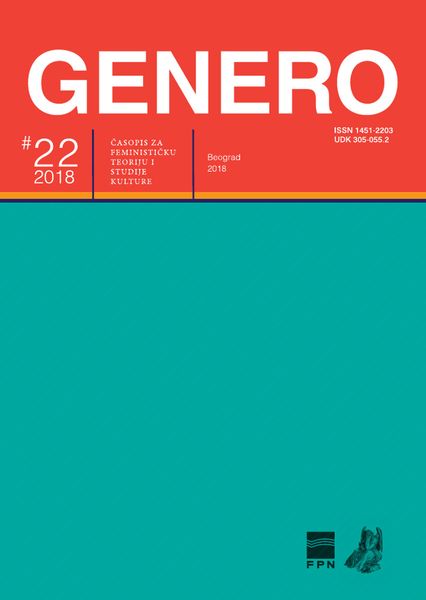ŽENSKA ANTIRATNA ESEJISTIKA: AUTSAJDERKA I VJEŠTICA KAO FEMINISTIČKE OTPADNICE U TRIMA GVINEJAMA I KULTURI LAŽI
Female Antiwar Essays: Outsider and Witch as Feminist Dissidents in Tree Guineas and Te Culture of Lies
Author(s): Natalija Iva StepanovićSubject(s): Gender Studies, Studies of Literature
Published by: Centar za ženske studije & Centar za studije roda i politike, Fakultet političkih nauka, Beograd
Keywords: antiwar essays; outsider; pacifsm; witch; feminism
Summary/Abstract: Nationality is a gendered concept, and only some can embody national subjects, become full citizens. Nationality is, just like the last name (its telltale sign), traditionally inherited by paternal lineage. I am interested in the history of otherness in anti-war essays by Virginia Woolf and Dubravka Ugresic whereby I analyze the outsider and the witch as paradigmatic fgures of dissidents. Virginia Woolf writes of femininity as of planetary exile. In Tree Guineas fascism is not treated as an extreme aberration but a consequence of the patriarchal sex-gender system. Woolf recognized totalitarian patterns among domestic, British tyrants. She invites women to refuse participation, to metaphorically step out of the procession of sons of educated men and stop supporting war eforts. Antiwar societies, personal donations and feminism are just not enough - women need to become pacifst outsiders. Published in prewar 1938, the essay was widely criticized. Te most controversial was the defnition of the war as “man’s game”. Dubravka Ugresic in Te Culture of Lies: Antipolitical Essays writes about the regional context. Her essays were written between 1988 and1995, and most of them were published in international magazines. Untranslated essays were read by few. Nevertheless, the author faced great persecutions. Te attack on fve Croatian intellectuals who have publicly criticized war-related sexual violence is known as the “Witches of Rio”case. Dubravka Ugresic accepts the label of a witch describing her as a stereotype destroyer and a dangerous woman. I tried to show that essays by these two authors share more than thematic similarity. Tey can be observed within the same theoretical paradigm in which feminine is existential outsiderness (Mayer) or innate nomadism (Braidotti).
Journal: Genero: časopis za feminističku teoriju i studije kulture
- Issue Year: 2018
- Issue No: 22
- Page Range: 89-112
- Page Count: 24
- Language: Croatian

